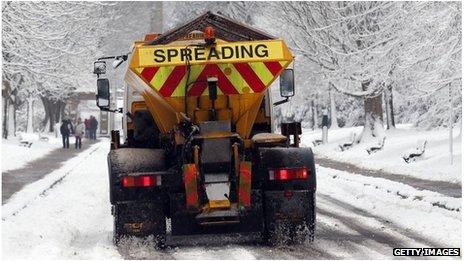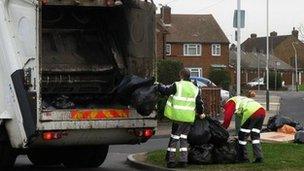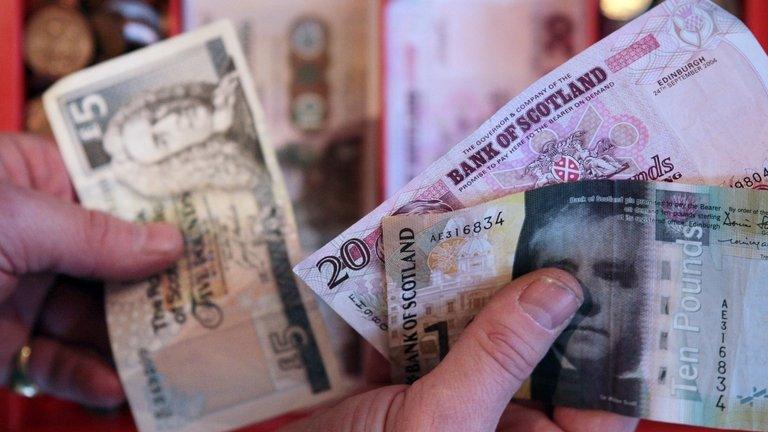Defrosting local finance
- Published

Options on spending for local services have been reduced by the council tax freeze
The phone rings. Someone from Ipsos Mori is on the line. She asks if you would pay more council tax if you could be certain it's used for services such as schools and care for local people.
You say "yes"? Of course you do. How could you not? We're talking here about schools and cute children, and isolated grannies needing care.
The pollsters might as well have thrown in motherhood and little kittens.
What you know is that the phone call is soon to end, and your opinion won't cost you anything.
But when you get to the polling station? Well, that's a very different matter.
Big bills, big savings
The freeze on council tax has been in place for six years. It's saved hard-pressed households hundreds of pounds.
Part of the nature of a freeze is that it means the biggest savings for the people who pay the biggest bills for the most valuable homes.
And if your council tax is paid via benefit, the freeze does you no good at all.
It may be that the impact of the freeze is proportionately more helpful to tax-paying poorer households, when measured relative to their lower income.
But amid a debate about inequalities, the freeze is far from being the fairest way to redistribute scarce resources.
A policy impaled
What's shown by this latest poll commissioned by the Convention of Scottish Local Authorities, is that people recognise there's a case for higher tax if people can be sure that contribution is used for better services.

Paying more for better services appeared to be a popular option
That's a big condition to place on the idea: people are far from persuaded that their tax pounds are efficiently spent.
What's also demonstrated is that Holyrood's main parties have got themselves impaled on the council tax freeze, and it's a tough task to get off that hook. The SNP says the freeze is in place until 2017, but they rightly say people tend to prefer having a bill that doesn't go up.
So how would they then make the case to remove it? A sudden conversion to local tax accountability?
The SNP also knows very well - as local government minister Derek Mackay made clear on Radio Scotland today - that their political opponents are stuck on the same hook.
The bigger picture is what this tells us about the relationship on tax powers. We're told that it's vital that the Holyrood parliament - whether devolved or independent - needs much greater tax-varying powers to match its spending powers.
Poll tax
So why doesn't that apply to local government? Before the disastrous poll tax, councils raised more than half their income from domestic rates. Its replacement with council tax came with a much bigger block grant, so that share of income generated from local households was cut to 20%.
With each year of freezing council tax, accompanied by a £70m payment to councils to make up for it, that share declines towards the point where there's hardly any functioning funding link left between councillors and bill-payers.
That could be a point at which it's not worth raising local taxation at all, and at which funding of all local services might as well come from central funds. Where is that point? We don't know. And we've barely even discussed it.
What's more, if councils were to return to making the case to their voters for providing better services in return for a tax rise, that gearing has made it ever more difficult to do so.
As an illustration, if a council sources only 20% of its income from council tax, then a 2% increase in its total budget would require a 10% increase in its council tax.
Credit and abuse
There are solutions, of course. One of the main planks of the SNP's 2007 election campaign was to ditch the "hated council tax", and replace it with local income tax.
That ran into difficulties with parliamentary arithmetic and later with council tax benefit to take account of the reform, while welfare's controlled from Whitehall.
But it also hit the harsh reality of governing, in that council funding reform creates winners, but also a lot of losers. And as I've noted before about tax change, the winners give you a lot less political credit than you get in abuse from the losers.
Labour, with Lib Dem partners, had similar problems when they ran Holyrood.
The failure to find an alternative for reform of council tax was horribly and repeatedly botched. And the independent commission set up to come up with a solution - which quite reasonably proposed a tax directly linked to the value of a home - was torn up by Labour First Minister Jack McConnell before the ink was dry.
Hated or unfair?
All that helps explain why, of the 650 questions on independence to which the Scottish government provides answers in its white paper, there's only the vaguest mention of replacing the council tax. And it's no longer "hated" but merely "unfair".
"Council tax and business rates are already devolved to the Scottish Parliament," it points out, in answer to question number 640, page 577. "There will be no change to their operation as a result of becoming independent."
So far, so cautious. There's then talk of consulting with others "to develop options for a fairer and more progressive local tax, based on the ability to pay [to be taken] forward after Scotland becomes independent".
What they'll find from tax experts is that one thing an independent nation ought to do is to nail down reliable tax sources from immovable buildings or land, rather than relying on income, which is harder to track and tax as it moves across borders.
All told, from a top priority of the 2007 manifesto, council tax reform has the look of something slipping quite a long way into the distance.
- Published2 January 2014
